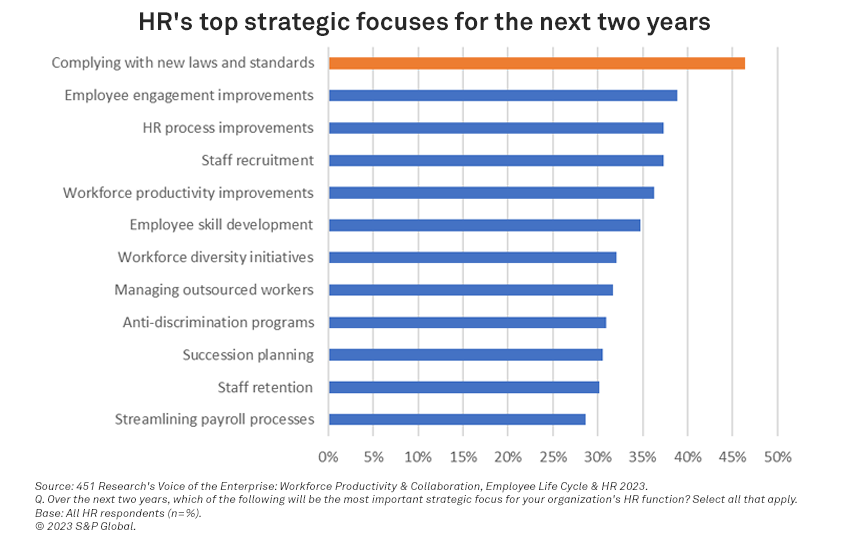
Generative artificial intelligence (GenAI) holds immense potential in human resources (HR), enabling automation, streamlining tasks and driving strategic focus. However, successful deployment hinges on addressing data quality, integration and ethical standards proactively, according to Conner Forrest, senior analyst at 451 Research, a part of S&P Global Market Intelligence.
While there are many use cases for GenAI in HR, data and algorithm quality, ethical concerns and legal compliance pose challenges to its adoption. Large-scale HR process automation in the following areas can be achieved with GenAI once these obstacles are overcome.

Core HR
GenAI-powered chatbots trained on corporate policy and standards should be able to improve self-service access in core HR tasks related to day-to-day management of the workforce, including inquiries on payroll and employee information management. Leveraging self-service access, GenAI has the potential to offer more personalized recommendations and provide automated guidance and support. Expressive is an example of an AI-enabled virtual assistant frequently used for core HR questions, which could be further enhanced by advances in GenAI.
Talent acquisition
Aside from providing information and scheduling interviews, GenAI tools can help with evaluation and recommendation to speed up recruiting, a process that often takes up too much time. Phenom and Eightfold are among the existing vendors that use GenAI features to generate job descriptions and job sites.
Additionally, GenAI can help to produce summaries of meeting notes and interview transcripts, and analyze verbal and nonverbal responses once the interview process kicks in. The technology can also be relied on to generate interview questions, with the goal to improve consistency and remove bias.
Performance management
GenAI’s personalization potential extends to employee management, offering tailored training and development programs based on individual skill gaps and career aspirations. It enhances accessibility and usability in performance management systems and addresses skill-development challenges, such as identifying the skills they could learn, in order to support a better employee experience. Furthermore, it streamlines career progression and internal mobility, with intelligent job recommendations based on skill acquisition. Notably, the generative capabilities of GenAI aid in performance reviews and creation of customized learning content, reflecting a future of highly tailored workforce development. Betterworks is an example of a vendor using GenAI to help generate goals and feedback in performance management.
Impact of GenAI-powered HR
GenAI holds the potential to upend HR work by enabling a more strategic, people-focused approach and a personalized employee experience. However, achieving this relies on extensive work from vendors across the HR tech stack, addressing not only cost and efficiency gains but also implementation, maintenance, training and compliance.
Want insights on AI trends delivered to your inbox? Join the 451 Alliance.

